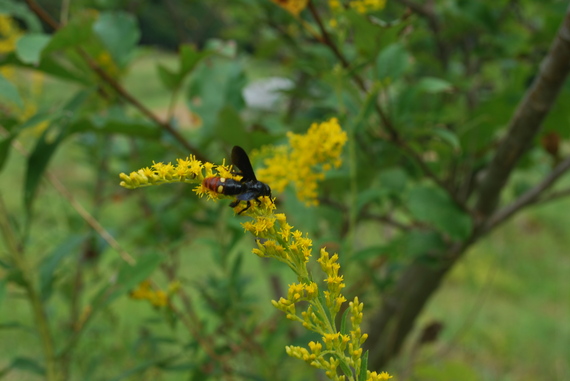This piece was originally published on Jewish Food Experience. The Jewish Food Experience (JFE), an exciting new project launched in December 2012, brings people together through the universal language of Jewish food, which is so much a part of Jewish culture, tradition and even religion.
As the Jewish New Year approaches, we look forward to cooler weather, fall greens and a chance for a fresh start. One of the essential parts of the Rosh Hashanah celebration is dipping apples in honey in hopes of a sweet new year. It seems significant that despite the millions of possible ways we could represent goodness and sweetness, we continue to dip apples in honey.
Since our tradition calls on us to make Jewish practice relevant in our lives, I think we should consider the ecological link between apples and honey. Apple production is wholly reliant on bees and other pollinators. So dipping apples in honey can be an expression of gratitude both for the fruit and the pollinators who help bring the fruit into being.
Now that the dramatic loss of honeybees, monarch butterflies and other pollinators is making front-page news, dipping apples in honey takes on a whole new significance. The tradition seems to point directly to thinking about our reliance on pollinators and how the loss of pollinators threatens our food supply, our Jewish traditions and the natural world.
The link between apples and honeybees is very direct. According to nationally known bee expert and advocate Marla Spivak, "Pollination is the most critical event in the yearly production of most apples. Orchard mason bees -- an early emerging solitary bee -- and honeybees are the main pollinators of apples." Quite simply, without bees and other pollinators, apples cannot form. And bees, especially honeybees are rapidly disappearing for lots of reasons including increasing pesticide use, loss of habitat, disease pressure and vast monocultures without flowering plants.
On our farm we had honeybees for about nine years. Even though we never had an excess of honey, the bees played an essential role on our farm, pollinating zucchini, melons, our tiny apple trees and other crops. Unfortunately, like so many others, we lost our bees due to a disease last winter and have not yet rebuilt our hives. Our losses are a tiny piece of a much larger loss of honeybees. Until we get new bees in place, we are relying on wild pollinators including wild bees and butterflies to ensure our crops come to fruition.
But there is so much more we can all do to help protect pollinators and help ensure future generations can pair apples and honey. On our farm, we should stop licking our wounds, restock our honeybees and do everything we can do keep them healthy and strong. Within the Jewish community, we can make an even larger impact. In our schools, synagogues, summer camps, JCCs and wherever the Jewish community owns land, we can plant thousands of pollinator gardens. Along with planting pollinator-friendly plants, we should reduce or eliminate the use of harmful pesticides and work to protect pollinator habitat in our communities.
Many are taking action to help protect pollinators like bees and butterflies, including initiatives like Michelle Obama's pollinator garden and legislation from Senator Barbara Boxer in California. The North American Pollinator Protection Campaign (NAPPC) brings together many organizations to help protect pollinators. According to executive director Laurie Adams, "The Pollinator Partnership stands ready to support individual and group efforts, and the benefits are bountiful for pollinators, plants and people." They also offer planting guides and lots of other resources to get started at home or in your community. Hazon is a Jewish organization that is also helping with these efforts.
Happy and Sweet New Year, 5775! Perhaps we all can help it be the year the pollinators start to recover and thrive.
